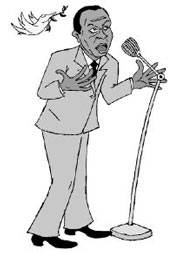FIFTY YEARS AGO this week, an internationally renowned star stood on the back of a flatbed truck in Whatcom County and talked and sang. And 40,000 people listened. In commemoration, singers and activists from British Columbia and Washington will converge on the Peace Arch this Saturday for a 50th-anniversary concert—to mark one of the more unusual events in Paul Robeson’s extraordinary career.
By 1952, Robeson was one of the 10 highest-paid concert artists in the world. His powerful voice, in the words of Seattle Labor Chorus director Janet Stecher, “created a new standard of what we expected to hear from a bass. Certainly, for people my age and older, when I hear ‘Old Man River,’ that’s what I hear.”
That voice transcended folk standards; Robeson was equally at home at folk festivals and in opera houses. But he was far more than a singer: a gifted and highly successful actor, an athlete, a writer, a barrier breaker who shattered the stereotypes and preconceptions of whites toward African-American performers through sheer talent and force of will. On other continents, the multilingual Robeson was even more popular.
But in the eyes of the U.S. government, none of that mattered. To the authorities, first and foremost, Robeson was a traitor, a red, a commie—a man whose popularity was extraordinary only in the threat that it posed. And so the government started blacklisting him and using other methods to destroy his career.
Which is how Robeson came to be on a flatbed truck at the Peace Arch, speaking and singing for 40,000 people on May 18, 1952. For some odd reason, Robeson—the son of an escaped slave; the first major concert artist to refuse to perform before segregated audiences; one man with a voice, a following, and a fervent desire for social justice—was such a presumed threat to the security of the United States that the government wouldn’t let him leave the country. (Abroad, audiences presumably could hear Robeson’s views on Jim Crow and other blemishes on the myth of American freedom. Or something.)
In February 1952, when Robeson was invited to perform at a convention of the Western district of the International Union of Mine, Mill, and Smelter Workers in Vancouver, British Columbia, it was no great surprise; Robeson frequently performed for, and advocated for, labor groups.
This particular union (known informally as Mine Mill) had a particularly radical reputation, in part due to its parentage— the old Western Federation of Labor and Industrial Workers of the World’s unionizing wars in the mining districts of northern Idaho, Montana, and eastern British Columbia a half-century previous. The U.S. government, in the grips of another Red scare, had revoked Robeson’s passport in August 1950, declaring that his travel was “contrary to the best interests of the United States.”
Passports weren’t customarily needed for U.S. citizens traveling to Canada, but in 1952 when Robeson reached the border at Blaine, he was not permitted to enter Canada on the grounds that he had become “a danger and a threat to the U.S. government.” And so, with Robeson forbidden to go to the convention, the convention went to him—along with tens of thousands of others—to hear a historic free Peace Arch concert. As his travel ban continued, Robeson would return to Blaine: He gave four concerts there between 1952 and 1955, all to huge audiences. Far more people heard his views and his singing than he would ever have reached had he simply been allowed to cross the border.
The concert marking the 50th anniversary of Robeson’s first appearance at Blaine is the work of two performers who share a passion for folk history and labor: Earle Peach, a dynamic social worker and labor activist, is the leader of Solidarity Notes, the Vancouver equivalent of the Seattle Labor Chorus; the Labor Chorus’ Stecher is one of Seattle’s treasures. Both were attending a Western Workers’ Heritage Festival in San Francisco two years ago when the idea to mark this little-known chapter in regional history was hatched.
Peach says times have changed at the border. He reports that cooperation from American border officials for the event has been good. Despite the attacks of Sept. 11, border paranoia is only a faint echo of what it was in 1952. “When you go across now,” he says, “they require proof of citizenship and ID, and there’s a guy in fatigues sitting across from the customs officer. Everybody looks pretty bored.”
The long lines and the guy in fatigues are reminders that borders can be opened or closed at will. Still, 2002 is a long way from the day when the son of an escaped slave had to stand on a truck and sing to make himself heard.
The Paul Robeson Memorial Concert will be from noon-5 p.m. Sat., May 18 at the Blaine Peace Arch. For more information, call 448-4888.








